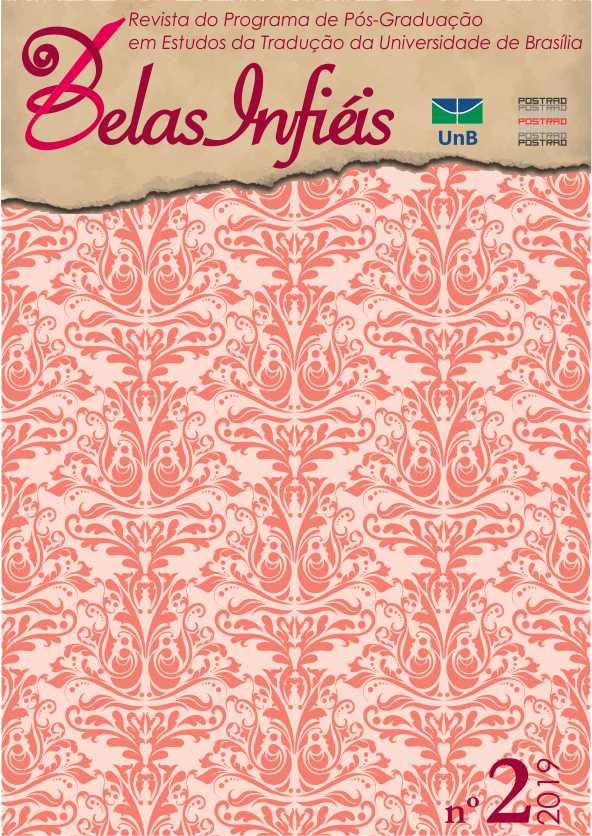Retos de la traducción del imaginario creole: negociar la distancia enunciativa entre texto original heterolingüe y traducción
DOI :
https://doi.org/10.26512/belasinfieis.v8.n2.2019.24378Mots-clés :
Creolidad. Lengua creole. Ethos. Heterolingüismo. Distancia enunciativa.Résumé
Presentamos en este artículo uno de los aspectos que emergen del análisis de las traducciones de textos literarios heterolingües: la dimensión enunciativa del texto traducido[i]. Siguiendo a Suchet (2010), analizamos la postura del responsable del texto meta o segunda enunciación, y su relación con la instancia enunciativa primera del texto fuente. Nos ocupamos de la escritura de uno de los representantes de la literatura antillana contemporánea, Patrick Chamoiseau, en una de sus novelas galardonadas con el premio Goncourt el año de su publicación, 1992, Texaco, y su versión española de 1994, traducida por Emma Calatayud. Junto con Jean Bernabé y Raphaël Confiant, Chamoiseau es uno de los impulsores del movimiento de la Creolidad, que persigue la reivindicación de la identidad y del imaginario antillano. En este contexto, en una primera etapa, abordamos las representaciones de la escritura y del escritor en un campo literario en construcción, el valor simbólico de las lenguas de escritura, los fenómenos heterolingües del original y la gestión de la alteridad en la traducción. En una segunda etapa, analizamos la gestión de la distancia enunciativa entre ambos textos donde es posible distinguir diferentes modos de negociación. Para la confección del corpus seleccionamos algunos fragmentos representativos del imaginario creole martiniqueño como la sabiduría vegetal y las creencias mágico-religiosas. Nuestro objetivo es doble: (1) identificar el /los tipo/s de ethos que se manifiesta/n en el texto traducido y (2) poner a prueba una herramienta de análisis que parte de la práctica de la traducción y contribuye a su redefinición como espacio de transformación que se abre al Otro en múltiples direcciones.
[i] Este artículo se enmmarca dentro del proyecto de investigación “La construcción del ethos y el tratamiento de los culturemas en situación de contacto de lenguas: su articulación en el campo de la Traductología y la Didáctica de las lenguas-culturas extranjeras” (H770, 2016-2020).
Téléchargements
Téléchargements
Publié-e
Comment citer
Numéro
Rubrique
Licence
Copyright Statement
Given the public access to this journal, the texts are free to use but requires the recognition of the original authorship and initial publication in this journal to be properly stated.
The journal allows the use of works published for non-commercial purposes, including the right to submit the work to publicly accessible databases. Published contributions are the sole and exclusive responsibility of the author(s).
- When submitting papers to be evaluated by the Belas Infiéis journal, the author(s):
- Declare that the contents of the contributions are original and of their original creation, being entirely responsible for their content if there is an objection by third parties.
- Claim to be aware that they should not commit academic plagiarism.
- Declare that the manuscript has not been published, completely or partially, in Portuguese or another language. If it is a translation it should be submitted to the Translated Articles section.
- Declare that the manuscript is not being evaluated by other journals.
- Declare that the manuscript was not submitted to another journal simultaneously.
- Commit(s) to inform the journal of any kind of error or inaccuracy in their contribution (published, in evaluation or in editing) and to collaborate with the editors to make due corrections of the article (when in evaluation or editing) or erratum/retraction (after publication).
- Declare that there is no conflict of interest regarding the published work.
- Authorize its release if it is accepted for publication without any kind of monetary compensation.
- Agree to assign non-exclusive rights to publication to the magazine, remaining free to make their contribution available in other media as long as the publication of the first version in Belas Infiéis magazine is mentioned. They also authorize Belas Infiéis to assign their texts for reproduction in content indexers, virtual libraries and similar platforms.
- Maintain copyright and grant the journal the right of first publication, the work being licensed under theCreative Commons Attribution License.
- Is/Are allowed and encouraged to publish and distribute their work online after the editorial process, which may increase the impact and citation of the published work.
- Authorize the editorial team to make textual adjustments and to adapt the article to the publication rules, when necessary.



















